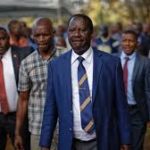Russia has condemned foreign powers for backing a Venezuelan opposition leader who declared himself interim president, calling it a bid to “usurp power”. Moscow said that the move violated international law and was a “direct path to bloodshed”. Juan Guaidó declared himself interim leader on Wednesday and was recognised by the US and several other nations.
President Nicolás Maduro, who also won support from some countries, has broken off diplomatic relations with the US. Mr Maduro took office in 2013 after the death of Hugo Chávez and was sworn in for a second term this month after elections last May that were marred by an opposition boycott and widespread claims of vote-rigging.
Mr Guaidó is the head of the National Assembly and has cited articles 233 and 333 of the constitution which allow him to assume interim power in the absence of the president. He argues Mr Maduro is not president because the elections are invalid. There was a major difference of opinion after President Donald Trump responded to Mr Guaidó’s declaration by recognising him as the new head of state and calling on others to follow suit.
Seven South American nations, Brazil, Colombia, Chile, Peru, Ecuador, Argentina and Paraguay, as well as Canada, backed the call. French President Emmanuel Macron stopped short of recognition, calling for democratic elections. The UK said last May’s elections were not free or fair and that it was “totally unacceptable” for Mr Maduro to break off ties with the US.
Mexico, Bolivia and Cuba expressed support for Mr Maduro, while Turkish President Recep Tayyip Erdogan tweeted: “My brother Maduro! Stand tall, we are standing by you.” China, a major investor in Venezuela, said it opposed any outside interference.
Moscow sees Venezuela as one of its closest allies in the region. It has lent billions of dollars and has backed its oil industry and its military. Russia has also taken part in military exercises in Venezuela. Kremlin spokesman Dmitry Peskov said: “We consider the attempt to usurp sovereign authority in Venezuela to contradict and violate the basis and principles of international law.



